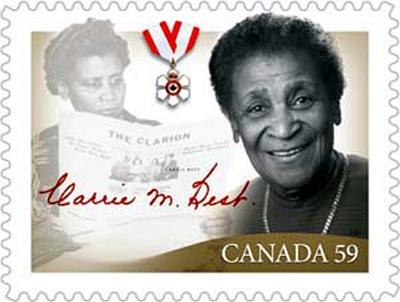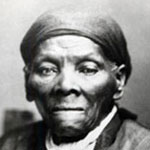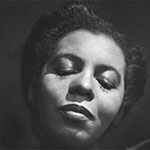
Carrie Best was well-known and admired for her many years of work on behalf of her people. Dr. Best died in 2001 but not before she had made her mark and helped to dispel some of the egregious racism that existed throughout her life.
Carrie Prevoe was born in New Glasgow, Nova Scotia in 1903. In 1925, she married Albert T. Best and changed her name to the one that under which she would rise to prominence. Her first brush with notoriety came in 1942 when she and her son Cal were arrested and charged with disturbing the peace for sitting in the whites only seats of The Roseland Theatre in New Glasgow (they were ultimately convicted and fined). Mrs. Best attempted to fight this injustice by undertaking anti-racist litigation against her home town. However, nothing came of it, and most of history seems to have forgotten about this episode.
From that point on, Mrs. Best became a vocal advocate for racial equality and social justice. In 1946, she founded The Clarion, the first black-owned, black-published newspaper in Nova Scotia. She used the newspaper to publicize the case of Viola Desmond, another black woman arrested and fined for sitting in the whites-only seats at Roseland. When Desmond appealed the ruling, Carrie Best travelled to Halifax to be in the courtroom to hear the case. Viola Desmond lost her first appeal, but continued to fight, and Mrs. Best continued to follow the case both in person and in The Clarion. Desmond won her second appeal, helping to put an end the Jim Crow laws in Nova Scotia.
The Clarion continued to be published until 1956, when it changed its name to The Negro Citizen and began national circulation. During that period, Mrs. Best also began broadcasting a radio show called The Quiet Corner. That show remained on the air for 12 years and was broadcast on as many as five stations across the Maritimes. In 1968, Carrie Best was hired as a Human Rights columnist for the Pictou Advocate. For seven years, she used that platform to fight for better conditions on Native Reserves, to end discrimination against black property owners, and to end racism in Canadian legal and political institutions.
She was well-known across the country as an equal rights activist and was a founding member of the Kay Livingstone Visible Minority Women of Nova Scotia, an organization which works with women and young people to promote a sense of identity and pride of race, integrity and self-discipline “and to lift others, as we ourselves climb toward dignity and self-respect.”
Her last doctorate was awarded in 1992 by the University of King’s College in Halifax. In 1970, she was awarded the Lloyd McInnis Memorial Award for her work in social justice. In 1973, she received the first annual award of the National Black Coalition of Canada. In 1974, she was appointed to the Order of Canada. In 1975, she was granted the degree Doctor of Laws by St. Francis Xavier University. In December of 1991, she received an award for outstanding contributions to human rights on the anniversary of the day the United Nations ratified the Declaration of Human Rights.
She was the author of an autobiography, That Lonesome Road (which is also a social history of Nova Scotian Blacks.)
Carrie Best died in her home town of New Glasgow, Nova Scotia on July 24, 2001. In 2002, she was posthumously awarded the Order of Nova Scotia.
See more here: http://rabble.ca/news/carrie-best-good-anyone-better-most
See more here: http://blogs.mcgill.ca/raceandethnicrelations/2014/02/12/black-history-month-carrie-best/







